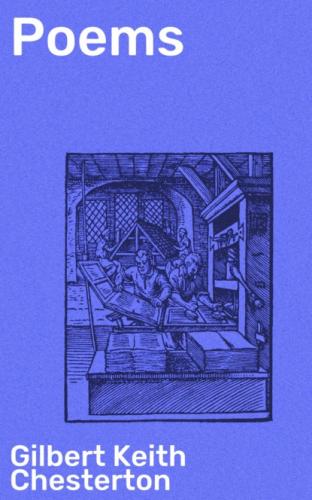The Pope was in his chapel before day or battle broke,
(Don John of Austria is hidden in the smoke.) The hidden room in man's house where God sits all the year, The secret window whence the world looks small and very dear. He sees as in a mirror on the monstrous twilight sea The crescent of his cruel ships whose name is mystery; They fling great shadows foe-wards, making Cross and Castle dark, They veil the plumèd lions on the galleys of St. Mark; And above the ships are palaces of brown, black-bearded chiefs, And below the ships are prisons, where with multitudinous griefs, Christian captives sick and sunless, all a labouring race repines Like a race in sunken cities, like a nation in the mines. They are lost like slaves that swat, and in the skies of morning hung The stair-ways of the tallest gods when tyranny was young. They are countless, voiceless, hopeless as those fallen or fleeing on Before the high Kings' horses in the granite of Babylon. And many a one grows witless in his quiet room in hell Where a yellow face looks inward through the lattice of his cell, And he finds his God forgotten, and he seeks no more a sign— (But Don John of Austria has burst the battle-line!) Don John pounding from the slaughter-painted poop, Purpling all the ocean like a bloody pirate's sloop, Scarlet running over on the silvers and the golds, Breaking of the hatches up and bursting of the holds, Thronging of the thousands up that labour under sea White for bliss and blind for sun and stunned for liberty. Vivat Hispania! Domino Gloria! Don John of Austria Has set his people free!
Cervantes on his galley sets the sword back in the sheath
(Don John of Austria rides homeward with a wreath.) And he sees across a weary land a straggling road in Spain, Up which a lean and foolish knight for ever rides in vain, And he smiles, but not as Sultans smile, and settles back the blade. … (But Don John of Austria rides home from the Crusade.)
THE MARCH OF THE BLACK MOUNTAIN 1913
WHAT will there be to remember
Of us in the days to be?
Whose faith was a trodden ember
And even our doubt not free;
Parliaments built of paper,
And the soft swords of gold
That twist like a waxen taper
In the weak aggressor's hold;
A hush around Hunger, slaying
A city of serfs unfed;
What shall we leave for a saying
Tc praise us when we are dead?
But men shall remember the Mountain
That broke its forest chains,
And men shall remember the Mountain
When it arches against the plains:
And christen their children from it
And season and ship and street,
When the Mountain came to Mahomet
And looked small before his feet.
His head was as high as the crescent
Of the moon that seemed his crown,
And on glory of past and present
The light of his eyes looked down;
One hand went out to the morning
Over Brahmin and Buddhist slain,
And one to the West in scorning
To point at the scars of Spain;
One foot on the hills for warden
By the little Mountain trod;
And one was in a garden
And stood on the grave of God.
But men shall remember the Mountain,
Though it fall down like a tree,
They shall see the sign of the Mountain
Faith cast into the sea;
Though the crooked swords overcome it
And the Crooked Moon ride free,
When the Mountain comes to Mahomet
It has more life than he.
But what will there be to remember
Or what will there be to see—
Though our towns through a long November
Abide to the end and be?
Strength of slave and mechanic
Whose iron is ruled, by gold,
Peace of immortal panic,
Love that is hate grown cold—
Are these a bribe or a warning
That we turn not to the sun,
Nor look on the lands of morning
Where deeds at last are done?
Where men shall remember the Mountain
When truth forgets the plain—
And walk in the way of the Mountain
That did not fail in vain;
Death and eclipse and comet,
Thunder and seals that rend:
When the Mountain came to Mahomet;
Because it was the end.
BLESSED ARE THE PEACEMAKERS
OF old with a divided heart
I saw my people's pride expand,
Since a man's soul is torn apart
By mother earth and fatherland.
I knew, through many a tangled tale,
Glory and truth not one but two:
King, Constable, and Amirail
Took me like trumpets: but I knew
A blacker thing than blood's own dye
Weighed down great Hawkins on the sea;
And Nelson turned his blindest eye
On Naples and on liberty.
Therefore to you my thanks, O throne,
O thousandfold and frozen folk,
For whose cold frenzies all your own
The Battle of the Rivers broke;
Who have no faith a man could mourn,
Nor freedom any man desires;
But in a new clean light of scorn
Close up my quarrel with my sires;
Who bring my English heart to me,
Who mend me like a broken toy;
Till I can see you fight and flee,
And laugh as if I were a boy.
THE WIFE OF FLANDERS
